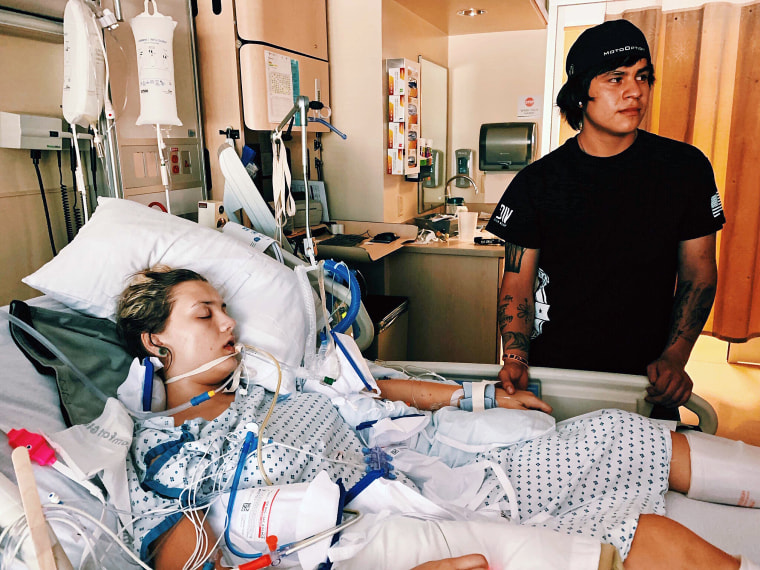At least 298 people have been hospitalized nationwide with severe lung disease apparently related to vaping.
The new number — a more than 50 percent jump from what the Centers for Disease Control and Prevention announced last Friday — is the result of data collected from state health departments by NBC News.
And now the health department in Milwaukee is taking the bold step of telling its residents in a health alert to stop using any kind of vaping device — immediately.
The department cites 16 people in Wisconsin who have been diagnosed with what health officials there are calling "severe chemical pneumonia" after vaping either nicotine or marijuana oils, extracts or concentrates.
Another 15 cases in that state are under investigation. There has been no single product or device linking all of the cases either in Wisconsin or in the 22 other states looking into cases.
The states with cases either confirmed or under investigation: Arkansas, California, Colorado, Connecticut, Georgia, Illinois, Indiana, Iowa, Kansas, Maryland, Michigan, Minnesota, New Jersey, New Mexico, New York, North Carolina, Ohio, Pennsylvania, Tennessee, Texas, Utah, Virginia and Wisconsin.
One person in Illinois has died.
The number of cases is likely an underestimate because the disease is so new to doctors. There isn't even an official name for it yet.
"We believe, looking back through our cases, that we probably have seen this in the past," Dr. Robin Deterding, chief of pediatric pulmonary medicine at Children’s Hospital Colorado, said in a news conference Thursday.
"I think we're going to learn that different variations and degrees of these conditions have been present before," she said.
Currently, there's no standardized way for physicians to report these kinds of illnesses to state or federal health officials who track diseases. The CDC and states are now scrambling to devise such a system.
"We are working with the CDC to develop a reporting mechanism consistent with other states and hope to have this in place in the upcoming days," a spokeswoman for the North Dakota Department of Health wrote in an email to NBC News.
What's more, some states, like Louisiana and Massachusetts, just this week sent what are called "health alert networks" to their providers with information on identifying lung diseases related to vaping.
This is a chemistry experiment that you keep inhaling.
Physicians around the country are now comparing notes — as well as biopsies of injured lungs.
"We've actually seen some of these biopsies, and they look different ... based upon what inhalant is coming into the lungs," Deterding said. "When you heat a substance, you release chemicals. This is a chemistry experiment that you keep inhaling."
Maddie Nelson, 18, of Nephi, Utah, said she had been vaping nearly every day for the past three years.
"I vaped lots of different products. Lots of different brands. Just anything that looked cool, really," Nelson told NBC News.
She said she started feeling mildly ill several months ago. It wasn't until Nelson started vomiting and ran a fever of 103 degrees Fahrenheit that she went to the hospital.
Within days, doctors put her into a medically-induced coma.

Nelson said she was diagnosed with eosinophilic pneumonia, which occurs when a type of white blood cell builds up in the lungs.
"The doctors told me it was directly linked to vaping," she said.
Nelson has largely recovered, but still requires oxygen support at night.
Teens aren't the only ones affected; the illness is also hitting adults. North Carolina's 15 patients have ranged in age from 16 to 72. The average age of patients in Illinois has been 22.
Minnesota's 20 cases have ranged in age from 16 to 37. Health investigators there interviewed seven of those patients; all of whom reported vaping THC, the psychoactive ingredient in marijuana.
“There is so much we don’t know about the contents of these products," wrote Dawn Berkowitz, director of Maryland's Center for Tobacco Prevention and Control, in a news release.
"The best way to keep yourself safe is to not use e-cigarettes or vapes."
Follow NBC HEALTH on Twitter & Facebook.

